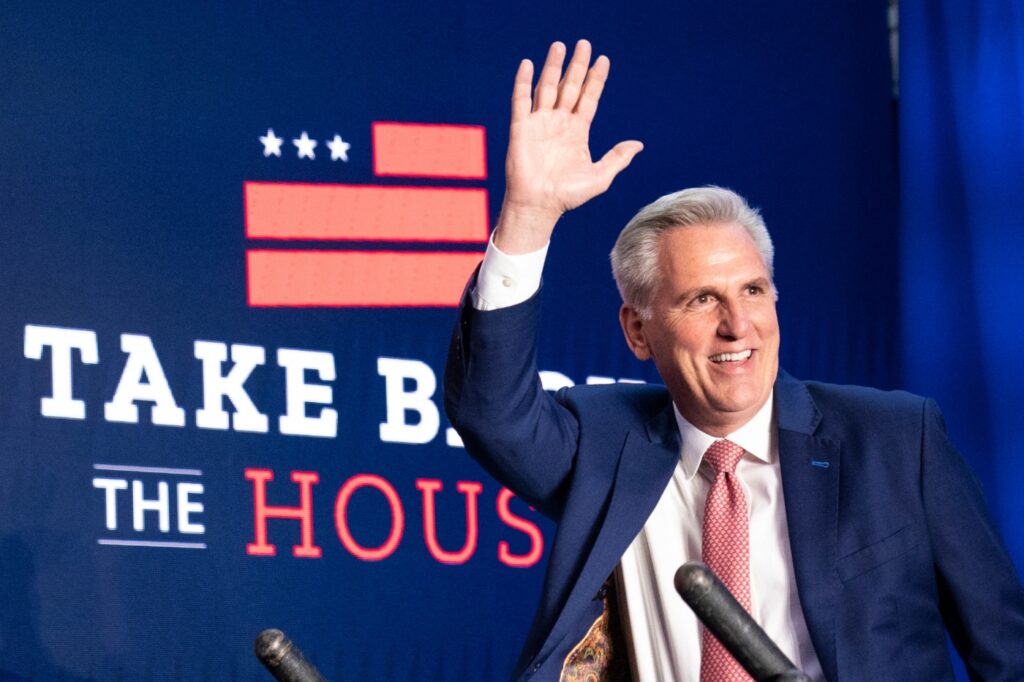
On January 3, Kevin McCarthy will be elected Speaker of the House. The seven Republican House members who have threatened not to support his election have no bargaining leverage. Their only threat is an endless series of votes on the House floor, magnifying the judgment already being proclaimed by the Democrats that House Republicans are incompetent.
Being the proximate cause of that conclusion would torpedo any hope the seven Republicans have of moving their party in the confrontational direction they avow. So, they won’t do it. However, if they prefer nihilism to relevance, here’s how they could pull the temple down upon their own heads.
The Constitution gives no more guidance than that the “House of Representatives shall chuse their Speaker and other Officers.” When the newly elected representatives gather in Washington in the first week of January, they are called to order by the clerk of the House, who was appointed by the speaker from the previous Congress – Nancy Pelosi. That clerk decides how many votes are needed to be elected speaker.
She has precedent she may choose to follow from January of 1997. On that occasion, Newt Gingrich received only 216 votes to be re-elected as speaker, because four Republicans voted for other Republicans, five voted present, and three were not present that day. The clerk nevertheless announced that Newt Gingrich had been elected speaker, as the recipient of “the largest number [of votes] cast for any Member-Elect and a majority of the whole number of votes cast [for any named candidate].”
Next week, if the seven Republican hold-outs vote “present,’ then the 1997 test would be met and McCarthy would win. However, if they vote for some other Republican, McCarthy would have met the first part of the 1997 test but not the second. McCarthy would have bested the Democratic nominee for Speaker, Hakeem Jeffries, by 215 to 213, but would have fallen short of the 218 required as a majority of the 435 who voted for a specific speaker candidate. The Democratic-appointed clerk would have followed the precedent set by Newt Gingrich’s clerk, making it hard to criticize her decision as partisan. As a result, subsequent votes would be needed, possibly many of them. There is no rule that the lowest vote-getter be dropped as sequential votes took place. The voting could go on for some time, with all other congressional business suspended until the speakership was resolved.
There has been some suggestion that, in that scenario, the Democrats might eventually be convinced to join a handful of centrist Republicans to elect a non-confrontational, pragmatic Republican as speaker. The compromise speaker would appoint even numbers of members to each House Committee, just the way Senate committee memberships were assigned over the last two years. Chairs would be chosen by secret ballot of committee members, diminishing partisan confrontation. This seems an attractive outcome to the many Americans who have come to loathe polarization in national politics.
Related Articles
The Golden State needs a course correction in the new year
Taxpayers’ list of the naughty and nice
Christmas wish list: school choice, CEQA reform and decriminalizing victimless vices
Prisons make substance use and mental illness worse, not better
At Christmas, remember it really is a wonderful life
Related Articles
The Golden State needs a course correction in the new year
Taxpayers’ list of the naughty and nice
Christmas wish list: school choice, CEQA reform and decriminalizing victimless vices
Prisons make substance use and mental illness worse, not better
At Christmas, remember it really is a wonderful life
If tempted to reach such a compromise, however, each side would be dissuaded by the historic example of the 1980 California Assembly. Republicans eventually broke a stalemate between the leading two Democrats vying to be speaker by supporting Willie Brown, whom Republicans perceived as less partisan. Republicans rued their decision ever after. Speaker Brown consolidated Democratic control of the Assembly for decades to come.
The likeliest resolution today is that the seven Republicans will vote “present.” That reduces the total number of votes needed by a Speaker candidate, according to the 1997 precedent, so Kevin McCarthy can win with 215 votes, just above half of the 428 votes cast for some candidate. The warning message to McCarthy will have been communicated, but the anti-McCarty Republicans won’t be responsible for a display of Republican incompetence. They also might take inspiration from the eventual outcome of the 1997 speakership vote—weakened, Gingrich resigned before the next speakership election.
Tom Campbell served in Congress for five terms, including during the time of the 1997 Speakership vote. He is now a professor of law and a professor of economics at Chapman University. He is the leader of the Common Sense Party of California, seeking to become an officially recognized political party.
